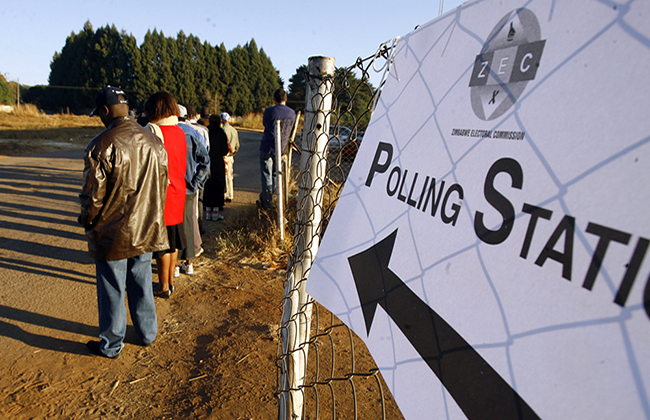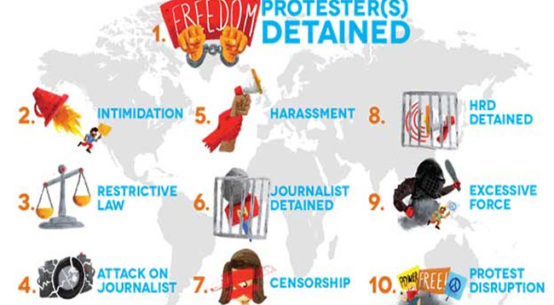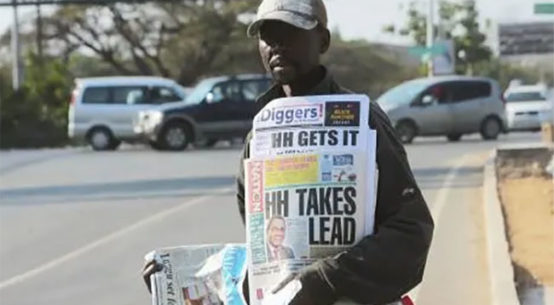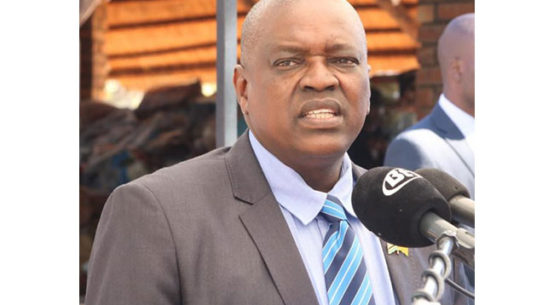
Global media watchdog, Reporters without Borders (RSF) has urged authorities in Zimbabwe to guarantee unwavering freedom to Internet and social media access as over 6 million people go to the polls in the Southern African state.
In recent months, the Emmerson Mnangagwa Government has slapped restrictive measures to foreign media houses, with some being denied accreditation as the hotly contested poll goes underway Wednesday, August 23.
Last week, journalists from Voice of America and the regional online, The Daily Maverick were denied press passes to that country accused of being hostile to the authority.
In recent months various independent media voices and observers have been shut off from accessing the voters and publishing stories deemed ‘inimical’ to the autocratic rule perceived favourable to state-run-and owned media.
The situation has seen heightened threats to media rights as evidenced by a wide range of press freedom violations, including local reporters repeatedly refused accreditation, international reporters denied entry and adoption of a “Patriot Law” that threatens the right to be informed.
The “Patriot Law”, approved by Parliament and signed by President Mnagagwa last June has punitive custodial and death penalty measures for anyone “willfully injuring the sovereignty and national interest of Zimbabwe.”
Journalists could be convicted for covering opposition meetings regarded as “anti-patriotic” under this controversial law, which is criticised by civil society and the media. The law promotes self-censorship by threatening journalists who cover meetings with dire consequences.
But the RSF calls on the authorities to tone down its ‘censorship’ and allow free-flow of information and provide an ideal landscape to all purveyors of news as the poll goes underway in the country, generally facing a myriad of concerns including ‘run-away’ inflation and devoid of press freedom.
It has joined a coalition of 46 civil society organisations in calling on the government to publicly undertake to keep the Internet, social media and other digital communication platforms accessible before, during and after the elections.
Sadibou Marong, Director of RSF’s sub-Saharan Africa desk in a statement contends that press freedom has remained difficult to attain by majority journalists with a call to authorities to guarantee unwavering space to journalists’ work during the general elections.
It urges introspection to authorities and not to arbitrarily suspend the Internet or social media so that Zimbabweans can have access to diverse and reliable reporting prior, during and after the poll.
The Zimbabwe race to the highest office is pitted between incumbent Mnagagwa and his alliance presidential candidate, Nelson Chamisa, leader of the Citizens Coalition for Change.
“In a country that sees many attacks against journalists, especially by ruling party politicians, and has just seen adoption of a so-called ‘Patriot Law’ liable to be used to gag the media, concern is high about how events will turn out for journalists on election day. “ he says.
“We remind the authorities of the media’s crucial role before, during and after elections and we ask them not to obstruct journalists’ work and to maintain access to the Internet and social media.”
The World Press Freedom Index has its own perception arguing that press freedom in Zimbabwe has improved “slightly” since Robert Mugabe’s reign, a new government measure may call its progress into question despite the punitive law that seeks to restrict media space.
Although the Constitution protects freedom of the media and of expression, including citizens’ right to “seek, receive and communicate ideas and other information”, the media landscape is still dominated by the state-owned Herald newspaper and Zimbabwe Broadcasting Corporation.
This is despite the fast-growing digital media providing platforms for citizens to exchange information and alternative narratives.
But even without the “Patriot Bill,” the media space has been a hard-hat area for media practitioners.
The Official Secrets Act and the Cyber Security and Data Protection Act are widely seen as impediments to the work of journalists .
Media practitioners are also under pressure to align with either the ruling party or the opposition, a polarisation that does not promote freedom of expression.
But the Afro barometer survey findings show that most Zimbabweans want a media that is free from government interference and that serves as a watchdog over the government, investigating and reporting on its mistakes and corruption.
Arguably, to the contrary, only a minority think the country currently has a free media.
Majorities also endorse the right of ordinary citizens and the media to access various types of government information, including budgets and expenditures for local government, bids and contracts, and salary information for teachers and local government officials.
Radio is still king among sources of news in Zimbabwe, though social media is challenging its dominance among young, urban, and educated citizens, according to reports.
However, there is some air of relief with the Southern African Development Community calling for free and fair elections as the polls go underway, says Zambia’s President Hakainde Hichilema who is also regional Chairperson of the SADC Organ on Politics, Defence and Security Cooperation.
“In the spirit of our communal values as SADC, we wish the people of Zimbabwe a peaceful and orderly electoral process. On behalf of the SADC family, I call upon all citizens of Zimbabwe to exercise their constitutional rights and participate in this crucial phase in their system of governance and to enhance our common goal for regional economic, political and social development.”
SADC calls for calmness by all players in the electoral process and urges them to wait for the outcome of the poll, it envisages it will be credible, free and fair as espoused under a democratic dispensation.




